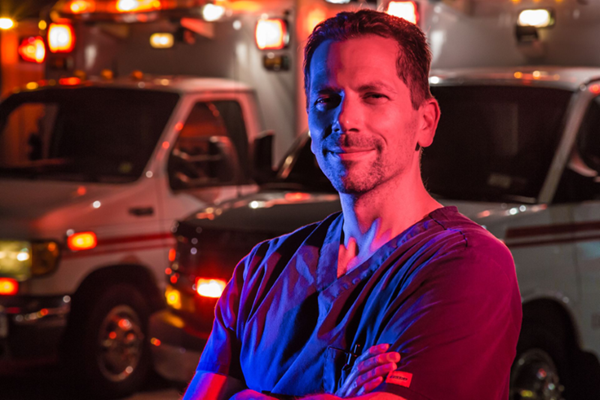
This edition of EMPower interviews ED critical care guru, Dr. Scott Weingart! Dr. Weingart received his medical degree and completed a residency in Emergency Medicine at the Mount Sinai School of Medicine. He then went on to fellowships in Trauma, Surgical Critical Care, and ECMO at the Shock Trauma Center in Baltimore. He is a professor of emergency medicine at Nassau University Medical Center and an adjunct professor at the Icahn School of Medicine at Mount Sinai.
In addition, Dr. Weingart is a physician coach concentrating on the promotion of eudaimonia and optimal performance. He is best known for his podcast on Resuscitation and ED Critical Care called the EMCrit Podcast, which has been downloaded > 100 million times.
What is your favorite thing about emergency medicine?
There aren't too many professions where just by showing up to work, you're doing good for the world. Our job has intrinsic good. We are providing a service that allows us to make the world a better place.
If you were restarting residency, what advice would you give yourself?
If anything was going on in the department, no matter where I was assigned, I was in the mix. Getting involved makes a huge difference, but not everyone in the department can do this, or the department will come to halt. Find the balance of being involved in the critical cases while not abandoning your assignments and responsibilities
What is the best career insight that you want to pass along?
One of the key factors to career longevity that often falls off as we progress is to have fun. With coaching, I get to take people who are already astounding in their career and make them better. Usually, the better is in terms of their enjoyment and appreciation of our amazing job. Emergency medicine has the most potential to have the 8-12 hours we are on shift be just pure joy. While we think the barriers to that ideal are systemic, what I find in coaching is that they are actually self-imposed. Go to the bathroom, drink and eat, pop outside for 60 seconds while calling a consult – keep it fun! You have far more agency in that regard than you think.
What is the most important trait for a leader to have?
The kind of leader I always wanted to be was "the innovator." Figuring out new and better ways to do things. However, this must be balanced with real care and compassion for the team members. Otherwise, it is brutal and relentless.
What is one thing you have learned from failure?
You can't take it too seriously. Mistakes are the best teacher. You can either get it right, or you can learn, and those are great options.
What is your best time management tip?
I've kept with a key precept from Getting Things Done by David Allen, which is that your mind should be for creating and making connections, not remembering things. There are external processes that can keep up with those things, like schedules and to-do lists. But there is complexity in how to manage these systems and the investment of 8-10 hours learning an excellent management style will pay off for decades.
Favorite chief complaint:
Altered mental status/unresponsive
What is the most significant risk you have taken and the outcome
Career-wise, doing critical care when there was no certification and no guarantee that there would be any jobs. Thanks to those who have fought for the certification pathway, it is a totally accepted pathway now. Either way, I’m so glad I made that choice.
Share 2 things that are on your desk right now.
- A skull, because of the stoic practice of memento mori (remember death). We are all mortal. Consider that each day could be our last, so live it. Let silly things go. Don't waste time.
- A really nice fountain pen. I believe in this time of insanse technology, we must harken back to the history of innovation as well!
What is the best on-shift snack?
- Free pizza or doughnuts, but these days I try not to indulge, but gosh they taste better for being grabbed on-shift.
- Something fatty and high protein. I'm a big fan of having mindful meals or snacks on shift. Take time to eat for 5 minutes.
What is the most recent book you read?
"Beautyland" by Bertino. It's about a girl who is convinced she is an alien and follows her throughout her life.
What are you learning about right now?
Learning is a full-time job. What I'm currently exploring is whether vasopressin could be a push or bolus dose.
What is your favorite song to hype you up before a shift?
"Paint It, Black" by the Rolling Stones
What message would you pass along to the readers of EM Resident?Remember how you were as a trainee when you become an attending. Trainees are not supposed to know better. They don't have the same understanding and knowledge as you do now, on day one.
Remember that even when it gets dark, this is the best job, and we are so lucky to be doing it. If you start having a more high-level view that most of the world would trade places with you in a heartbeat, that will give you a better perspective.
Do you have an idea for someone you want to hear and learn from on EMPower? Please let us know, at emresident@emra.org.



